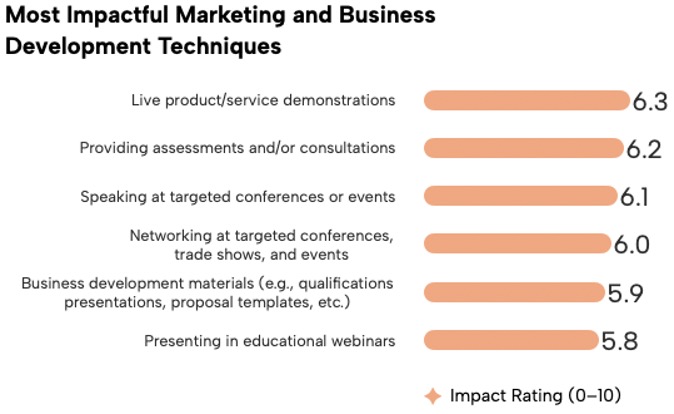We have written before about what it takes to become a Visible Expert® in your industry. In this article, we will focus on the one skill we believe can accelerate your Visible Expert journey faster than any other. Call it a superpower, if you like.
But this superpower affects more than the professionals who wield it. It elevates their firm, too. How do we know? Because we did the research.
What the Research Says
In our 2025 High Growth Study, the best-performing professional services firms identified which marketing and business development techniques deliver the greatest impact. Here are the top six:

One thing that struck me right away: Two of these top six techniques involved speaking to a live audience. Speaking at conferences and presenting in webinars involve similar skills. And both are part of a thought leader’s playbook.
This data also backs up what we learned in our research on Visible Experts. Here are the top three impact ratings from that study:

Clearly public speaking—in all its guises—not only has value, but true impact on the visibility and reputation of firms and their experts.
Why Public Speaking Works
Speaking in-person or online offers a few advantages that are not available in, say, written content.
First, as a presenter you are automatically in a position of authority. Your words, opinions and advice carry more weight than they might in another setting.
Second, it’s more personal. Whether you are speaking to a packed room or an invisible group of webinar attendees, your audience can associate a face (or, in some cases, a voice) with your expertise. That’s a powerful connection.
Third, your audience gets to sample your thinking and expertise in action. Even though your message is delivered in a controlled environment, that experience is enough to generate feelings of trust.
Fourth, if you are participating in a live event, you can leave time for questions and answers—and address a few of your audience’s real-world challenges.
How Experts Become Speakers
Now, I know that public speaking is not for everyone. Even the best speakers started out tentatively, but their confidence grew with every experience. Most people can conquer their natural anxiety and become capable, even inspiring, public speakers.
The trick is to start small. Some novices join an organization, such as Toastmasters, that helps people learn the craft. Others play a supporting role in a few webinars, then build experience until they are ready to host a webinar on their own. Still others deliver short speeches at local groups such as chambers of commerce.
The most important thing a firm can do is support their experts in this journey. Leadership should encourage their experts to seek out speaking opportunities—even provide resources to help find, reach out to and negotiate with them. Give your experts the time to prepare their presentations and, if they like, to practice in front of a few friendly colleagues.
Where Do Experts Speak?
Below are some of experts’ most common speaking channels. Most of these can be used to increase visibility and nurture relationships.
- Conferences. Your goal should be to secure speaking opportunities, not just attend the conference. If you can, try to incorporate research data into your presentations to make them more informative and persuasive. Public speaking can expose you to new audiences as well as deepen your engagement with those who know you.
- Webinars. Webinars are today’s digital version of seminars. One nice feature is that you can record the presentation then offer it later on an on-demand basis. This gives your webinars a long shelf life. Webinars are an excellent way to nurture people who already know who you are. At the same time, they can be a powerful tool to impress newcomers, as well. And with the right partnering and promotional strategy, they can also be an excellent way to expand your visibility.
- Podcast and radio appearances. These two mediums are great ways to increase your visibility. You can either establish your own podcast, as many experts have, or seek out guest appearances on other people’s podcasts. Running your own podcast is a large undertaking, so you may want to start out as a guest. Then there’s radio. Just because it was invented over a century ago doesn’t mean it’s irrelevant. Today, most radio talk shows are not only broadcast live but recorded and made available to listeners on demand. Sounds a lot like a podcast!
- Videos and video blog posts. Videos can be used in a variety of ways. They can become video blog posts, arranged as channels on video platforms such as YouTube or included in relevant places on your website. Videos are also critical to establishing your speaking credentials.
How many experts in your firm are presenting to live audiences? The more you can make your experts known in the marketplace, the faster you’ll grow.

